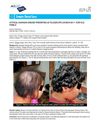 353 citations,
February 2022 in “Nature Immunology”
353 citations,
February 2022 in “Nature Immunology” Long-haul COVID can cause lasting symptoms affecting many body systems and may be linked to ongoing inflammation and immune system issues.
 4 citations,
March 2021 in “International Journal of Dermatology”
4 citations,
March 2021 in “International Journal of Dermatology” COVID-19 and related stress may increase hair loss known as Telogen effluvium.
 40 citations,
May 2010 in “Australasian Journal of Dermatology”
40 citations,
May 2010 in “Australasian Journal of Dermatology” Chronic hair shedding may be caused by less variation in hair growth times and might stop on its own after several years.
 71 citations,
January 2016 in “International Journal of Trichology”
71 citations,
January 2016 in “International Journal of Trichology” Biotin deficiency is not a major cause of hair loss in women, so biotin supplements are not likely to be an effective hair loss treatment.

A woman had temporary hair loss due to stress from a spinal cord injury.

The document concludes that severe trauma can cause temporary hair loss, known as Telogen Effluvium, which usually resolves without treatment.
 December 2007 in “CRC Press eBooks”
December 2007 in “CRC Press eBooks” Alopecia areata incognita causes widespread hair loss without patches and needs a scalp biopsy for diagnosis.
 6 citations,
October 2012 in “BMJ”
6 citations,
October 2012 in “BMJ” The woman's hair loss was mainly due to stress and low iron levels, and her hair grew back after treatment.
 September 1997 in “Journal of the European Academy of Dermatology and Venereology”
September 1997 in “Journal of the European Academy of Dermatology and Venereology” Adults can develop late-onset loose anagen syndrome, which may often be misdiagnosed.
 September 2022 in “Journal of The American Academy of Dermatology”
September 2022 in “Journal of The American Academy of Dermatology” A woman's COVID-19 related hair loss improved after using a specific hair care routine for 30 days.
 December 2022 in “International Journal of Women's Dermatology”
December 2022 in “International Journal of Women's Dermatology” The Sinclair Shedding Scale is effective for diagnosing Alopecia Areata Incognita and monitoring treatment success.
 3 citations,
January 2020 in “Annals of Dermatology”
3 citations,
January 2020 in “Annals of Dermatology” More atypical club hairs may indicate Telogen Effluvium.
 May 2021 in “Journal of the American College of Cardiology”
May 2021 in “Journal of the American College of Cardiology” An 11-year-old girl with Kawasaki disease experienced hair loss that improved after treatment.
 March 2023 in “Journal of Cosmetic Dermatology”
March 2023 in “Journal of Cosmetic Dermatology” Dilated scalp capillaries might be a sign of hair loss related to COVID-19.
 October 2024 in “Annals of Allergy Asthma & Immunology”
October 2024 in “Annals of Allergy Asthma & Immunology” Anaphylaxis from cow's milk allergy can cause temporary hair loss in children.
 August 2024 in “Skin Research and Technology”
August 2024 in “Skin Research and Technology” PRP is an effective and safe treatment for female hair loss.
 January 2010 in “Journal of The American Academy of Dermatology”
January 2010 in “Journal of The American Academy of Dermatology” The document provided instructions for completing a CME exam on diagnosing and managing hair loss.
 44 citations,
January 2021 in “Dermatologic Therapy”
44 citations,
January 2021 in “Dermatologic Therapy” COVID-19 may cause hair loss due to infection stress or treatments.
 September 1997 in “Journal of The European Academy of Dermatology and Venereology”
September 1997 in “Journal of The European Academy of Dermatology and Venereology” Alopecia linked to higher anxiety and personality disorders.
 54 citations,
January 2005 in “Journal of The American Academy of Dermatology”
54 citations,
January 2005 in “Journal of The American Academy of Dermatology” Most patients with chronic hair shedding did not progress to permanent hair loss, and one showed improvement with treatment.
 13 citations,
March 1990 in “JAMA”
13 citations,
March 1990 in “JAMA” Topical eye β-blockers might cause hair loss, which usually gets better after stopping the medication.

Eye drops with β-blockers may cause hair loss.
 January 2022 in “Journal of Skin and Stem Cell”
January 2022 in “Journal of Skin and Stem Cell” Trichodynia is a painful scalp condition needing targeted treatments beyond symptom management.
 5 citations,
December 2015 in “Dermatologic Therapy”
5 citations,
December 2015 in “Dermatologic Therapy” Using a certain drug on the skin can help prevent hair loss caused by pulling on the hair.
 April 2016 in “Journal of Investigative Dermatology”
April 2016 in “Journal of Investigative Dermatology” Phenylephrine may help prevent hair loss from pulling on the hair roots.
 December 2023 in “Journal of family medicine and primary care”
December 2023 in “Journal of family medicine and primary care” Many people in Saudi Arabia experienced hair loss after COVID-19, especially women, those treated with antivirals, and those with a history of hair shedding.
 November 2017 in “Dermatologic Therapy”
November 2017 in “Dermatologic Therapy” A new topical solution safely reduces hair shedding by 38% on average by tightening a muscle in the scalp.
 20 citations,
March 1990 in “JAMA”
20 citations,
March 1990 in “JAMA” Topical eye β-blockers may cause hair loss.
 3 citations,
March 2022 in “Annals of Medicine”
3 citations,
March 2022 in “Annals of Medicine” Hair shedding after COVID-19 is more linked to the disease's severity and inflammation rather than hormones, with women at higher risk.
 May 2024 in “World Journal Of Advanced Research and Reviews”
May 2024 in “World Journal Of Advanced Research and Reviews” Low iron levels are strongly linked to chronic hair loss in women.






























